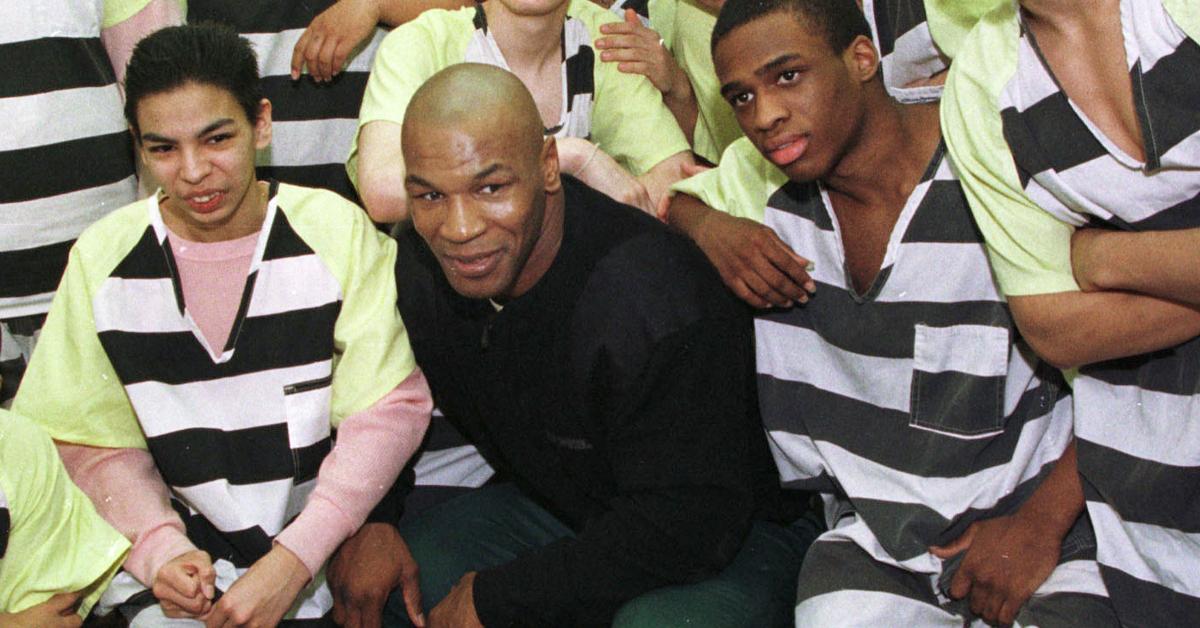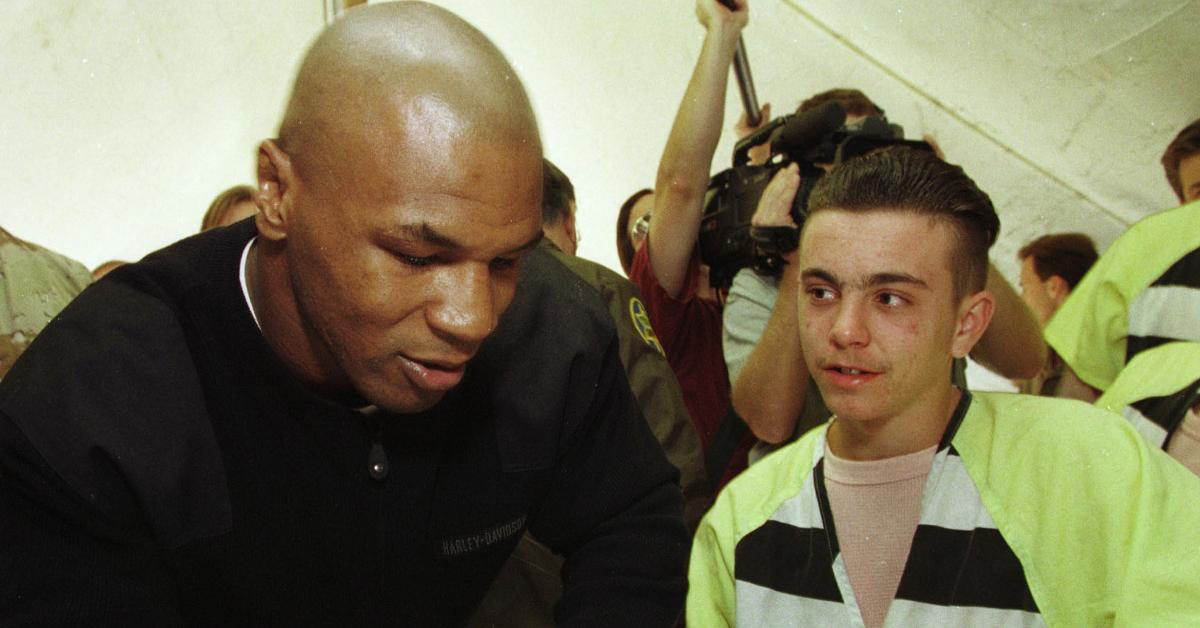Tyson's Journey: Why Tyson Went To Jail And The Lessons Learned
The name Tyson Fury is synonymous with boxing greatness, but his journey has been anything but straightforward. From world championships to personal struggles, Tyson's life has captivated audiences worldwide. However, one question often arises: why did Tyson go to jail? This article dives deep into the reasons behind his legal troubles, the impact on his career, and the lessons we can learn from his experiences.
Tyson Fury, a British professional boxer, is known for his incredible achievements in the ring. However, his life outside the ring has been marked by challenges and controversies. Understanding why Tyson went to jail requires an exploration of his personal struggles, the legal system, and the factors that led to his incarceration.
This article aims to provide a comprehensive overview of Tyson's legal issues, focusing on the reasons behind his imprisonment, the consequences it had on his career, and the steps he took to rebuild his life. By the end of this article, readers will gain a deeper understanding of Tyson's journey and the importance of resilience in overcoming adversity.
Read also:Project Runway Michelle The Inspiring Journey Of A Rising Fashion Star
Table of Contents
- Biography of Tyson Fury
- The Legal Troubles: Why Tyson Went to Jail
- Impact on Tyson's Boxing Career
- Tyson's Personal Struggles
- Rehabilitation and Redemption
- Lessons Learned from Tyson's Journey
- Public Perception and Media Coverage
- The Importance of a Strong Support System
- Future Prospects for Tyson Fury
- Conclusion: Tyson's Legacy
Biography of Tyson Fury
Early Life and Career
Tyson Fury was born on June 12, 1988, in Manchester, England. Known for his towering height and exceptional boxing skills, Tyson quickly rose to prominence in the sport. He turned professional in 2008 and went on to win several world titles, including the WBA, IBF, and WBO heavyweight championships.
Below is a brief overview of Tyson Fury's personal and professional life:
| Full Name | Tyson Luke Fury |
|---|---|
| Birth Date | June 12, 1988 |
| Birthplace | Manchester, England |
| Professional Debut | 2008 |
| Major Titles | WBA, IBF, WBO Heavyweight Champion |
The Legal Troubles: Why Tyson Went to Jail
Understanding the Incident
In 2017, Tyson Fury was sentenced to jail for drug-related offenses. The charges stemmed from a 2016 incident where he was found in possession of cocaine and other controlled substances. This incident was part of a broader pattern of substance abuse that Tyson had been battling for years.
According to reports, Tyson's legal troubles were not just limited to drug possession but also included allegations of driving under the influence. These charges highlighted the depth of his personal struggles and the need for professional intervention.
Impact on Tyson's Boxing Career
A Career on Hold
Tyson's incarceration had a significant impact on his boxing career. During his time in jail, Tyson missed several opportunities to defend his titles and compete in major fights. This hiatus not only affected his financial stability but also raised questions about his ability to return to the ring.
Despite these challenges, Tyson's fans remained loyal, and his reputation as one of the greatest boxers of his generation remained intact. His absence from the sport only fueled speculation about his future in boxing.
Read also:Find Hope And Answers National Center For Missing And Exploited Children
Tyson's Personal Struggles
Battling Depression and Addiction
Tyson Fury's journey to jail was deeply rooted in his personal struggles with mental health and addiction. In interviews, Tyson has openly discussed his battles with depression and anxiety, which began shortly after winning the heavyweight titles in 2015.
- Depression: Tyson revealed that he struggled with severe depression, which led to a loss of motivation and interest in boxing.
- Addiction: Substance abuse became a coping mechanism for Tyson, ultimately leading to his legal troubles.
- Self-Harm: Tyson admitted to contemplating self-harm during his darkest days, highlighting the severity of his mental health issues.
Rehabilitation and Redemption
A Path to Recovery
Following his release from jail, Tyson committed himself to rehabilitation and recovery. He entered a treatment program for addiction and sought professional help for his mental health issues. This period of self-reflection and healing marked a turning point in Tyson's life.
Tyson's dedication to recovery was evident in his return to boxing. In 2018, he made a triumphant comeback, defeating Francesco Pianeta in his first fight after a two-year absence. This victory symbolized Tyson's resilience and determination to rebuild his life and career.
Lessons Learned from Tyson's Journey
Key Takeaways
Tyson Fury's experiences offer valuable lessons for individuals facing similar challenges:
- Seek Help Early: Addressing mental health and addiction issues early can prevent them from escalating into legal problems.
- Build a Support System: Surrounding oneself with supportive friends, family, and professionals is crucial for overcoming adversity.
- Resilience Matters: Tyson's ability to bounce back from his lowest points demonstrates the power of resilience and determination.
Public Perception and Media Coverage
Media's Role in Tyson's Story
The media played a significant role in shaping public perception of Tyson Fury's legal troubles. While some outlets focused on the negative aspects of his story, others highlighted his efforts to overcome adversity. This dual narrative created a complex portrayal of Tyson, reflecting both his flaws and his strengths.
According to a study by the British Journal of Sports Medicine, media coverage of athletes' legal issues often influences public opinion. In Tyson's case, the media's portrayal of his journey from jail to redemption helped humanize him and garner sympathy from his fans.
The Importance of a Strong Support System
Family and Friends
Tyson Fury's recovery was heavily influenced by the support of his family and friends. His wife, Paris Fury, played a pivotal role in his rehabilitation, encouraging him to seek help and stay focused on his goals. Similarly, Tyson's trainer and management team provided the necessary guidance to help him return to boxing.
Research from the National Institute on Drug Abuse emphasizes the importance of a strong support system in overcoming addiction. Tyson's story serves as a testament to this principle, showcasing how love and encouragement can facilitate recovery.
Future Prospects for Tyson Fury
A Brighter Horizon
Despite his past challenges, Tyson Fury's future looks promising. Since his return to boxing, Tyson has achieved numerous victories, solidifying his status as one of the sport's top contenders. In 2023, Tyson announced plans to retire from boxing, leaving behind a legacy of resilience and perseverance.
Outside of boxing, Tyson has expressed interest in pursuing acting and media projects. His charisma and storytelling ability make him a natural fit for these ventures, ensuring that his influence extends beyond the ring.
Conclusion: Tyson's Legacy
In conclusion, Tyson Fury's journey from jail to redemption is a powerful reminder of the human capacity for resilience and growth. By addressing his personal struggles and committing to recovery, Tyson has not only reclaimed his boxing career but also inspired countless others to seek help and overcome adversity.
We invite you to share your thoughts on Tyson's story in the comments below. For more insightful articles and updates, subscribe to our newsletter and stay connected with us on social media. Together, let's celebrate the triumphs of those who rise above their challenges and inspire others to do the same.
Article Recommendations


